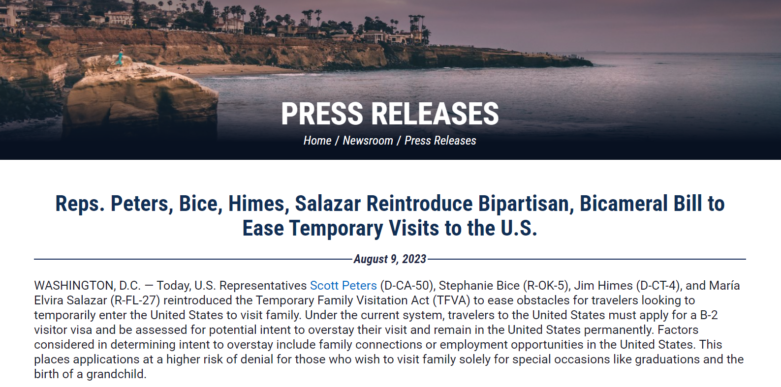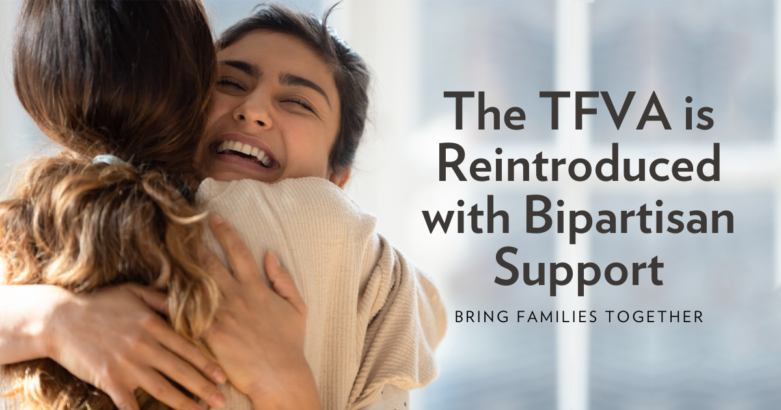Representative Scott Peters Press Release | August 9, 2023
Read the original press release here.
WASHINGTON, D.C. — Today, U.S. Representatives Scott Peters (D-CA-50), Stephanie Bice (R-OK-5), Jim Himes (D-CT-4), and María Elvira Salazar (R-FL-27) reintroduced the Temporary Family Visitation Act (TFVA) to ease obstacles for travelers looking to temporarily enter the United States to visit family. Under the current system, travelers to the United States must apply for a B-2 visitor visa and be assessed for potential intent to overstay their visit and remain in the United States permanently. Factors considered in determining intent to overstay include family connections or employment opportunities in the United States. This places applications at a higher risk of denial for those who wish to visit family solely for special occasions like graduations and the birth of a grandchild.
The TFVA would establish a new B-3 nonimmigrant visa category specifically for relatives of U.S. citizens and permanent residents that would allow stays of up to 90 days per calendar year. The application would require a U.S. family member to sign a letter of financial support for the applicant and would be prohibited from sponsoring an applicant if a previously sponsored relative overstayed their visa. The bill also requires applicants to purchase travel medical insurance for the duration of their stay. Finally, the TFVA would prohibit travelers entering the country on a B-3 visa from filing a change of status application while in the United States.
“Hundreds of constituents have asked my office to help them obtain a visitor visa for family members so they can attend meaningful events such as weddings, graduations, and childbirths. The bill we introduced today will make practical changes that make it easier for families to be together for these special occasions while strengthening our tourism-driven economy in San Diego,” said Rep. Peters.
“Allowing family members of U.S. citizens or permanent residents to temporarily visit the United States to be reunited for a funeral, a wedding, or to meet a new grandchild, is the right thing to do. The current visa options significantly limit the amount of time an individual can stay in the country. This legislation allows for visitation up to 90 days and ensures that the U.S. family member is responsible for the financial and medical support of the visitor during their stay,” said Rep. Bice.
“Life’s most meaningful moments are meant to be shared. This legislation would help families living across national borders come together for weddings, graduations, childbirths, and other special occasions without opening a door for visitors to overstay their VISAs. I am proud to join this bipartisan group of lawmakers in introducing this important legislation to help my constituents reunite with their loved ones,” said Rep. Himes.
“Thousands of my constituents in South Florida have families overseas they have not seen in years – including many that have come here as refugees from some of Latin America’s most brutal regimes.The Temporary Family Visitation Act finally gives those families a chance to reunite, boosts our economy, and ensures our visa laws are respected and enforced,” said Rep. Salazar.
U.S. Senators Rand Paul (R-KY) and Richard Blumenthal (D-CT) plan to reintroduce the Senate companion to this bill soon.
Family members allowed to apply for B-3 nonimmigrant visas under the TFVA would include spouses, children, grandchildren, parents, grandparents, great-grandparents, siblings, uncles, aunts, nieces, and nephews.
“The TFVA advances the interests of Iranian Americans and all Americans who have loved ones who live abroad. This much-needed legislation will boost our local economies while also underscoring the United States’ commitment to family values. Thanks to the efforts of Representatives Peters, Bice, Himes, and Salazar, and Senators Paul and Blumenthal, the TFVA provides the opportunity for loved ones to finally come together for life’s most important moments. PAAIA encourages Congress to take swift action to pass this legislation,” said PAAIA Executive Director Neda Bolourchi.
Full text of the legislation here.

